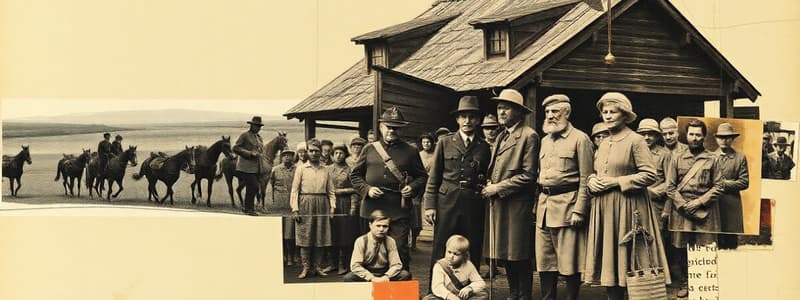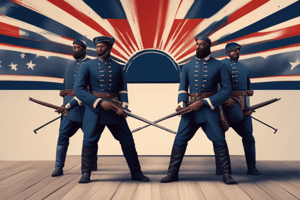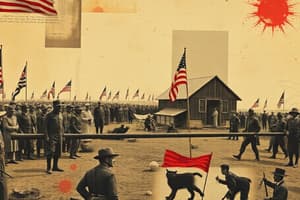Podcast
Questions and Answers
What was the primary reason Abraham Lincoln's election led to the secession of Southern states?
What was the primary reason Abraham Lincoln's election led to the secession of Southern states?
Southern states feared Lincoln would abolish slavery.
What action did Lincoln take in response to the attack on Fort Sumter?
What action did Lincoln take in response to the attack on Fort Sumter?
Lincoln declared war on the southern states.
What was the significance of the Emancipation Proclamation issued by Lincoln?
What was the significance of the Emancipation Proclamation issued by Lincoln?
It freed the slaves in the southern states and garnered support for the Union.
What characterized the economy of the Southern states after gaining independence from Britain?
What characterized the economy of the Southern states after gaining independence from Britain?
Identify the key turning point battle in the American Civil War and its outcome.
Identify the key turning point battle in the American Civil War and its outcome.
What were the effects of the Civil War on the Southern states?
What were the effects of the Civil War on the Southern states?
How did the Industrial Revolution impact the Northern states' workforce?
How did the Industrial Revolution impact the Northern states' workforce?
What did Lincoln order regarding Southern ports in April 1861?
What did Lincoln order regarding Southern ports in April 1861?
What was a major difference in the views on slavery between the North and the South?
What was a major difference in the views on slavery between the North and the South?
What role did tariffs play in the conflict between the Northern and Southern states?
What role did tariffs play in the conflict between the Northern and Southern states?
What did the Reconstruction Period aim to address after the Civil War?
What did the Reconstruction Period aim to address after the Civil War?
How did the admission of new states contribute to the tensions between the North and the South?
How did the admission of new states contribute to the tensions between the North and the South?
What was the outcome of the Civil War in 1865 concerning slavery?
What was the outcome of the Civil War in 1865 concerning slavery?
What were the social conditions faced by slaves in the Southern states?
What were the social conditions faced by slaves in the Southern states?
What was the main cause of the American Civil War according to the content?
What was the main cause of the American Civil War according to the content?
Describe the anti-slavery movement in the Northern states.
Describe the anti-slavery movement in the Northern states.
Flashcards are hidden until you start studying
Study Notes
Development of Northern and Southern States
- Northern states encompassed areas north of Pennsylvania; Southern states covered territories south of Maryland.
- Southern economy was heavily agricultural, focusing on plantation crops like cotton, rubber, and tea, relying on slave labor.
- Northern states experienced an industrial revolution (1815-1860) with factories, urbanization, and a labor force of wage-earning skilled workers.
- Strong anti-slavery movement in the North, leading to the practical abolition of slavery by that region.
Causes of the American Civil War
- Slavery: Central issue of conflict; harsh treatment of slaves, lack of rights, and fear of punishment for escape fueled the abolition movement.
- Taxes: Disputes over tariffs; Northern states sought protective tariffs to protect their industries while Southern states opposed them due to increased costs.
- Admission of New States: Controversy over whether new states (e.g., Texas, New Mexico, California) would be free or slave states heightened tensions.
- Election of Abraham Lincoln: Lincoln's anti-slavery stance alarmed Southern states; led to the secession of 11 Southern states forming the Confederate States of America in 1861.
- Attack on Fort Sumter: Marked the start of hostilities in 1861 when Southern forces fired on this federal fort, prompting war declaration by Lincoln.
Key Events in the Civil War
- Blockade: Lincoln ordered a naval blockade of Southern ports in April 1861, severely restricting Southern trade and resources.
- Emancipation Proclamation: Issued by Lincoln in 1862, it declared the freedom of slaves in Southern states, gaining support for the Union cause.
- Battle of Gettysburg: Fought in June 1863; significant Union victory with over 45,000 casualties, deemed a turning point in the war.
- Gettysburg Address: Lincoln delivered a pivotal speech at the cemetery dedication, reinforcing the principles of equality and national unity.
- Final Submission of Southern States: After four years of conflict, Southern states surrendered in 1865; led to the formal abolition of slavery.
Effects of the Civil War
- Slavery was abolished across the USA, effectively ending the institution.
- Preservation of the unity of the United States was achieved.
- Southern states were left in ruins, prompting a period of reconstruction to rebuild and reintegrate them into the Union.
Studying That Suits You
Use AI to generate personalized quizzes and flashcards to suit your learning preferences.



